Social Watch news
Published on Mon, 2012-02-06 07:50

Jim Stanford, (Photo: CAW/TCA)
|
Political leaders boast that the Canadian economy has fully recovered from the recession, and that it was not as severe there as it was in other countries. It turns out that both of those claims are false because they don't take population growth into consideration, according to a study released by the Canadian Centre for Policy Alternatives (CCPA, one of the focal points of Social Watch)
|
Published on Fri, 2012-02-03 07:38
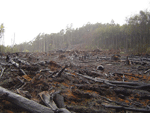
Photo : Crustmania/Flickr/CC
|
New factors in deforestation like the world economic crisis, speculation in markets for basic products and arable land, and worsening poverty and climate change are aggravating the old causes of this phenomenon such as the advance of agricultural frontiers, tree cutting for timber and fuel, and the use of wood as a fuel. This problem is reported and documented in the Social Watch Report 2012.
|
Published on Thu, 2012-02-02 08:13
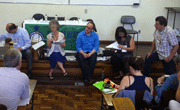
Photo: Agência Jovem de Notícias.
|
“Inequality is the reason why, contradicting all the theories and models, world poverty is not diminishing or is doing so only very slowly even in countries where the economy is growing quickly,” according to Roberto Bissio, the coordinator of Social Watch, speaking at the presentation of the Portuguese edition of the latest annual report by this international network of civil society organizations.
|
Published on Wed, 2012-02-01 08:18
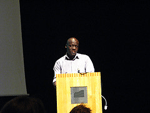
Philip Thigo. (Photo: Indigo Trust)
|
The Indigo Trust, a foundation based in London that funds technology-driven projects to bring about social change in African countries, awarded the Social Development Network (SODNET, focal point of Social Watch in Kenya) a grant of £30,750 that acknowledges its consistent work to improve the lives of ordinary citizens through its Infonet programme.
|
Published on Tue, 2012-01-31 07:48
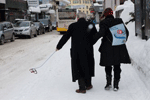
Demonstration at Davos. (Photo:
Eliane Baumberger/Aliance Sud)
|
Fifty "invisible" dogs strayed through the streets of Davos last Wednesday, within sight of the World Economic Forum (WEF). The European Coalition for Corporate Justice drew much attention with a rally, calling to put corporations on a short leash – like the invisible dogs. The heads of Greenpeace International and Amnesty International supported the alliances' core demand: corporations should be required by law to comply with human rights and environmental standards.
|
Published on Tue, 2012-01-31 07:43
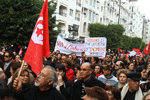
Photo: TunisiaLive
|
Thousands of demonstrators chanted “No to violence”, ”No to extremism”, “No Niqab, no to Salafism” and “Universities are free, extremism out,” at a march that took place in Tunis last Saturday, convened by political parties, unions and civil society organizations calling for freedom of expression. Violations and assaults committed by a group of Salafists against residents of Sejnane were confirmed by Abdel Sattar Ben Moussa, President of the Tunisian League of Human Rights (LTDH, one of the national focal points of Social Watch).
|
Published on Fri, 2012-01-27 07:23

A Somali woman waits in line for
food with her baby. (UN Photo
|
Speculation on lands and commodities, the boom of biofuels, agricultural and aid policies set up by rich countries and multilateral organizations and the climate change exacerbates the food crisis all over the world, as Social Watch Report 2012 makes apparent. Those conclusions find new prove with two more recent studies, one prepared by Friends of the Earth Europe and other by Save the Children and Oxfam.
|
Published on Fri, 2012-01-27 07:20
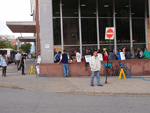
Postal strike in Vancouver.
(Photo: Guilhem Vellut/Flickr/CC)
|
Federal cutbacks announced in the 2010 and 2011 budgets will result in more than 60,000 job losses, says a study released today by the Canadian Centre for Policy Alternatives (CCPA, one of the focal points of Social Watch in that country). Any additional cuts in the upcoming federal budget would result in even more job losses.
|
Published on Thu, 2012-01-26 07:45
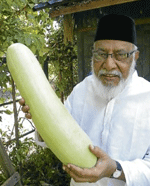
CAP president S.M. Mohamed Idris
showing a huge gourd.
(Source: New Strait Times)
|
Do you want to know the secret of growing big and healthy vegetables without a drop of chemical fertiliser? The Consumers Association of Penang's (CAP, one of the focal points of Social Watch in Malaysia) teaches you how to do it at its organic garden on Jalan Mesjid Negeri.
Using its own vermicompost and fertilisers, CAP has produced bottle gourds weighing 4kg and measuring 46cm within 40 days. "Panchakavya organic growth promoters and earthworm fertilisers were used to grow these bottle gourds," said CAP education officer N.V. Subbarow.
|
Published on Wed, 2012-01-25 07:46

Project Rakeeb's symbol.
|
The third round of the elections in Egypt was a meaningful democratic exercise, with relatively few reports of violence or intimidation. The main irregularities were the widespread active political campaigning in and around polling centers, which resulted in sporadic violence, and the denial of access to observers, according to Project Rakeeb, a watchdog program run by two civil society organizations.
|

|













